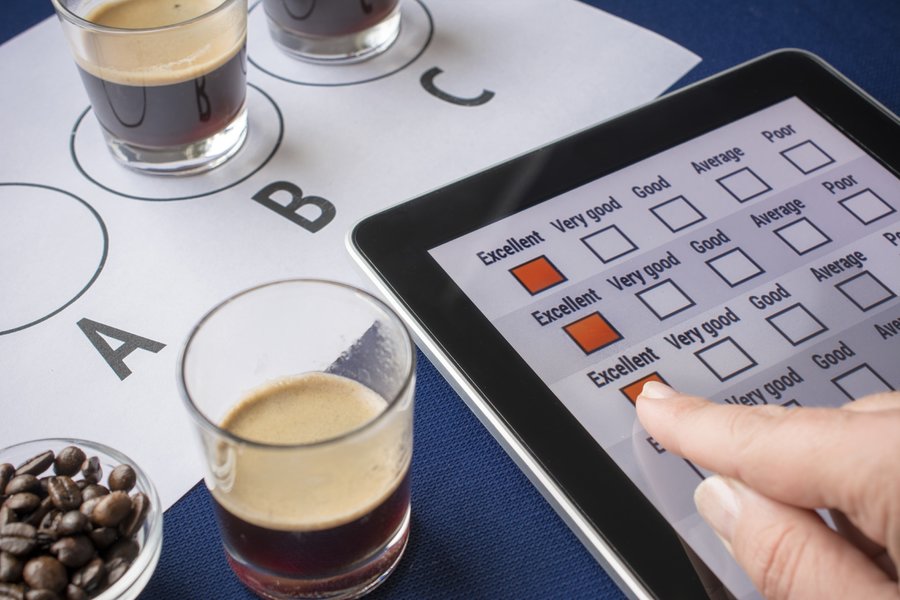ISO 60712 Sensory Evaluation in Energy Drinks
The ISO 60712 standard provides a framework for conducting sensory evaluation of food and beverages, emphasizing the importance of consistent and reliable methods. In energy drinks, this is crucial as it ensures that the product not only meets consumer expectations but also complies with international standards. Sensory evaluation in energy drinks involves assessing attributes such as aroma, taste, mouthfeel, and visual appearance to ensure quality consistency.
The process begins with selecting a panel of trained assessors who undergo rigorous training to develop their sensory skills. This ensures that the evaluations are objective and accurate. The assessors then use standardized methods to evaluate samples under controlled conditions to minimize variability. The results from these assessments are used to make informed decisions about product development, quality control, and compliance.
Energy drinks present unique challenges for sensory evaluation due to their intense flavors and complex formulations. These products often contain a mix of sugars, caffeine, vitamins, and other ingredients that can influence the overall sensory profile. The ISO 60712 method allows for detailed assessment of these elements, ensuring that each component contributes positively to the consumer experience.
The standard also emphasizes the importance of traceability in the production process. This involves maintaining records of all sensory evaluations conducted and linking them to specific batches or lots of product. Traceability is essential for identifying any issues early on and implementing corrective actions promptly.
By adhering to ISO 60712, manufacturers can enhance their reputation by consistently delivering products that meet customer expectations. This leads to increased consumer satisfaction and loyalty, which are critical factors in the competitive energy drink market. Additionally, compliance with international standards helps companies navigate global markets more smoothly, ensuring they meet regulatory requirements without sacrificing product quality.
Understanding the complexities of sensory evaluation is key to producing high-quality energy drinks that resonate with consumers. This service ensures that every aspect of the product's sensory profile is meticulously evaluated, contributing significantly to overall customer satisfaction and brand reputation.
Why It Matters
Ensuring consistent quality in energy drinks through sensory evaluation is vital for several reasons. First, it helps manufacturers identify potential issues early in the production process, allowing them to address these before they affect the final product. This proactive approach not only enhances product quality but also reduces costs associated with rework or recall.
Secondly, sensory evaluation plays a crucial role in maintaining brand consistency across different batches and markets. Consistent taste and aroma profiles are essential for building trust among consumers who rely on familiar flavors and sensations. This consistency is particularly important in the dynamic energy drink market where trends can change rapidly.
Thirdly, compliance with international standards like ISO 60712 provides a competitive edge by demonstrating a commitment to quality and reliability. Customers today are more discerning than ever before, expecting not only great taste but also safe and ethically produced products. Meeting these expectations through rigorous sensory evaluation can set brands apart in crowded marketplaces.
Finally, sensory evaluation supports continuous improvement efforts within the company. By regularly assessing product attributes, manufacturers can identify areas for enhancement or innovation. This ongoing process ensures that energy drinks remain relevant and appealing to consumers while staying ahead of market trends.
Scope and Methodology
| Sensory Attribute | Evaluation Criteria | Evaluation Method |
|---|---|---|
| Aroma | Intensity, pleasantness, and similarity to reference samples. | Panelists assess using standardized techniques under controlled conditions. |
| Taste | Bitterness, sweetness, sourness, and overall flavor balance. | Assessment through structured descriptive analysis (SDA). |
| Mouthfeel | Texture, viscosity, and aftertaste. | Panelists evaluate using a calibrated sensory wheel. |
| Visual Appearance | COLOR consistency, clarity, and presence of any foreign particles. | Photographic documentation followed by panelist review. |
The ISO 60712 standard outlines a comprehensive approach to sensory evaluation that covers all these aspects. Each attribute is evaluated systematically using trained assessors who follow standardized procedures. This ensures that the results are reliable and repeatable, providing valuable insights into product quality.
Benefits
Enhanced Product Quality: Ensures consistent taste, aroma, and mouthfeel across all batches.
Increased Consumer Satisfaction: Delivers products that meet high standards of quality and reliability.
Brand Protection: Protects brand reputation by ensuring compliance with international standards.
Competitive Advantage: Differentiates the product in a crowded market, enhancing its appeal to consumers.
Cost Efficiency: Prevents costly rework or recall by identifying issues early in the production process.
Market Expansion: Facilitates entry into new markets by meeting regulatory requirements and consumer expectations.
Continuous Improvement: Supports ongoing efforts to enhance product attributes through regular evaluation.
The benefits of ISO 60712 sensory evaluation extend beyond just the quality of individual products. It contributes significantly to the overall success of energy drink brands by fostering customer loyalty and trust, which are critical factors in this fast-moving industry.





